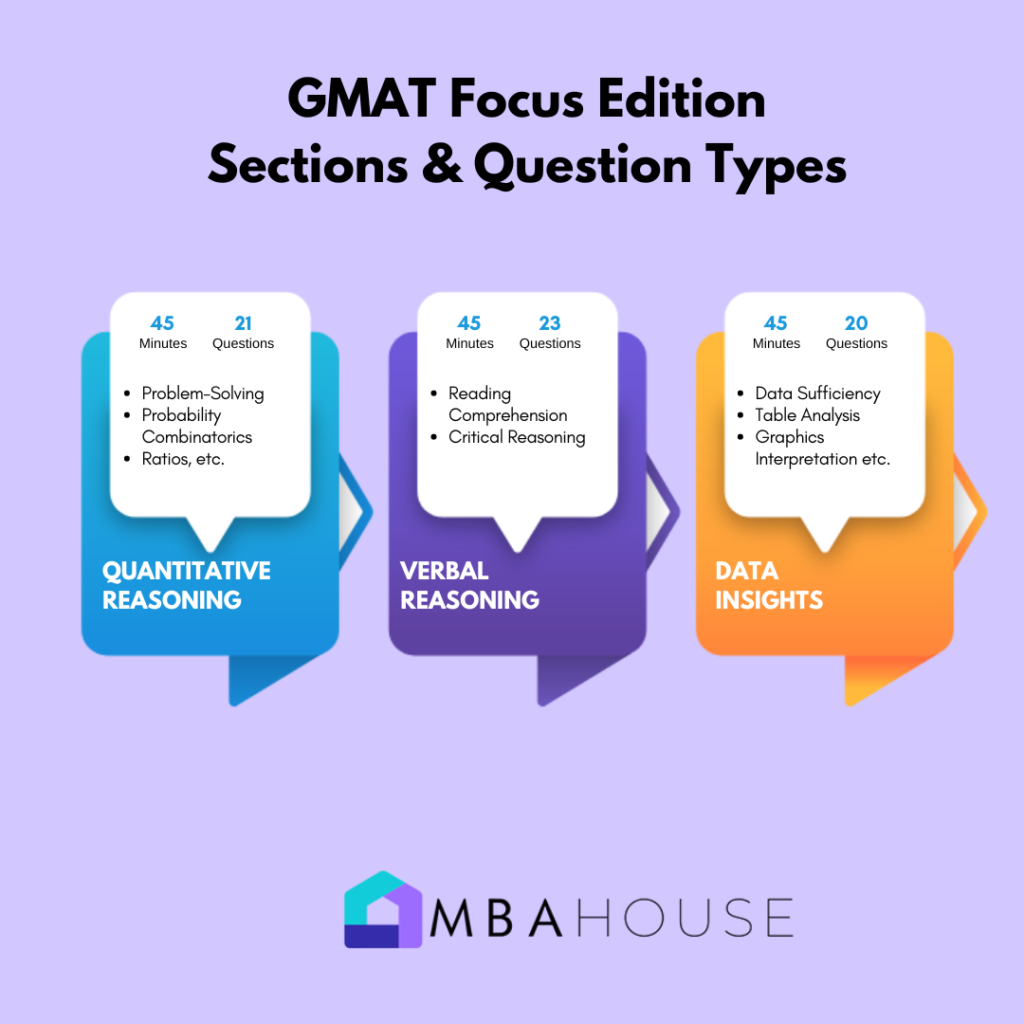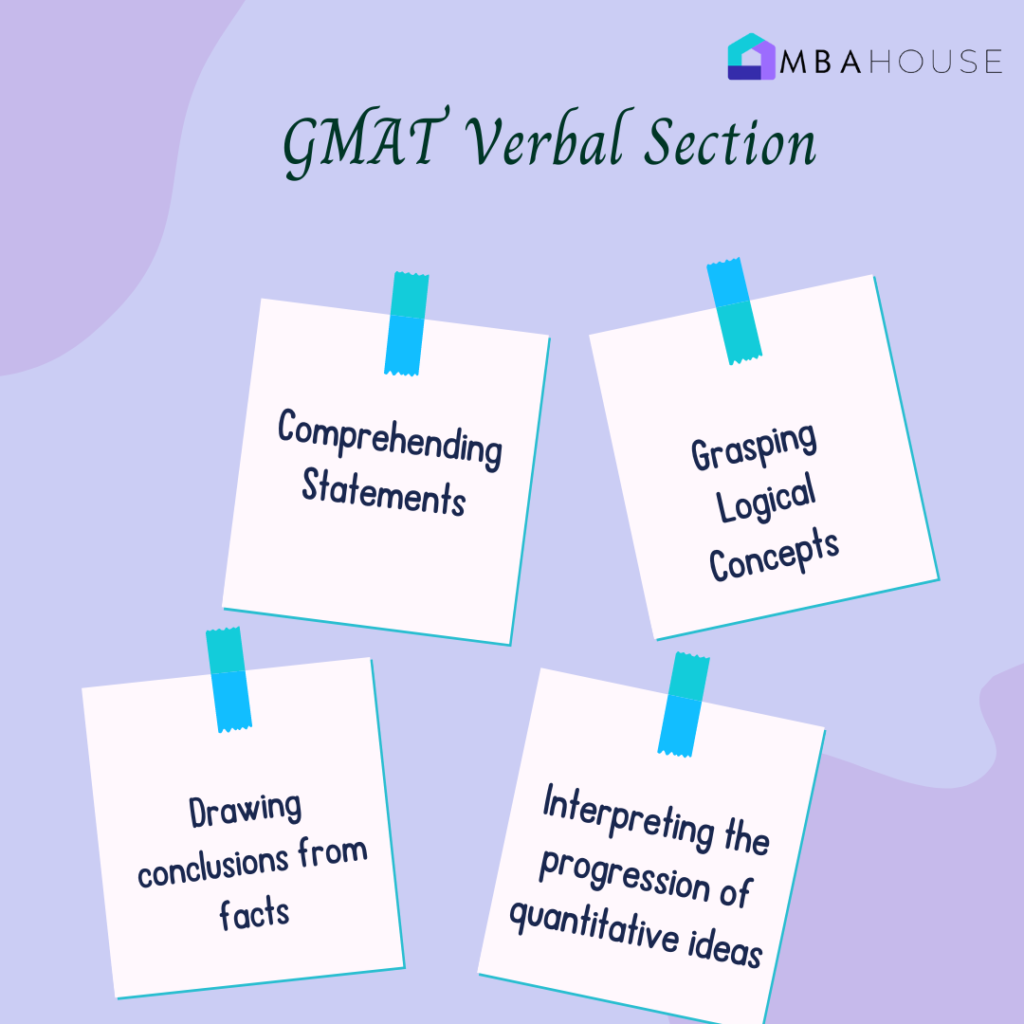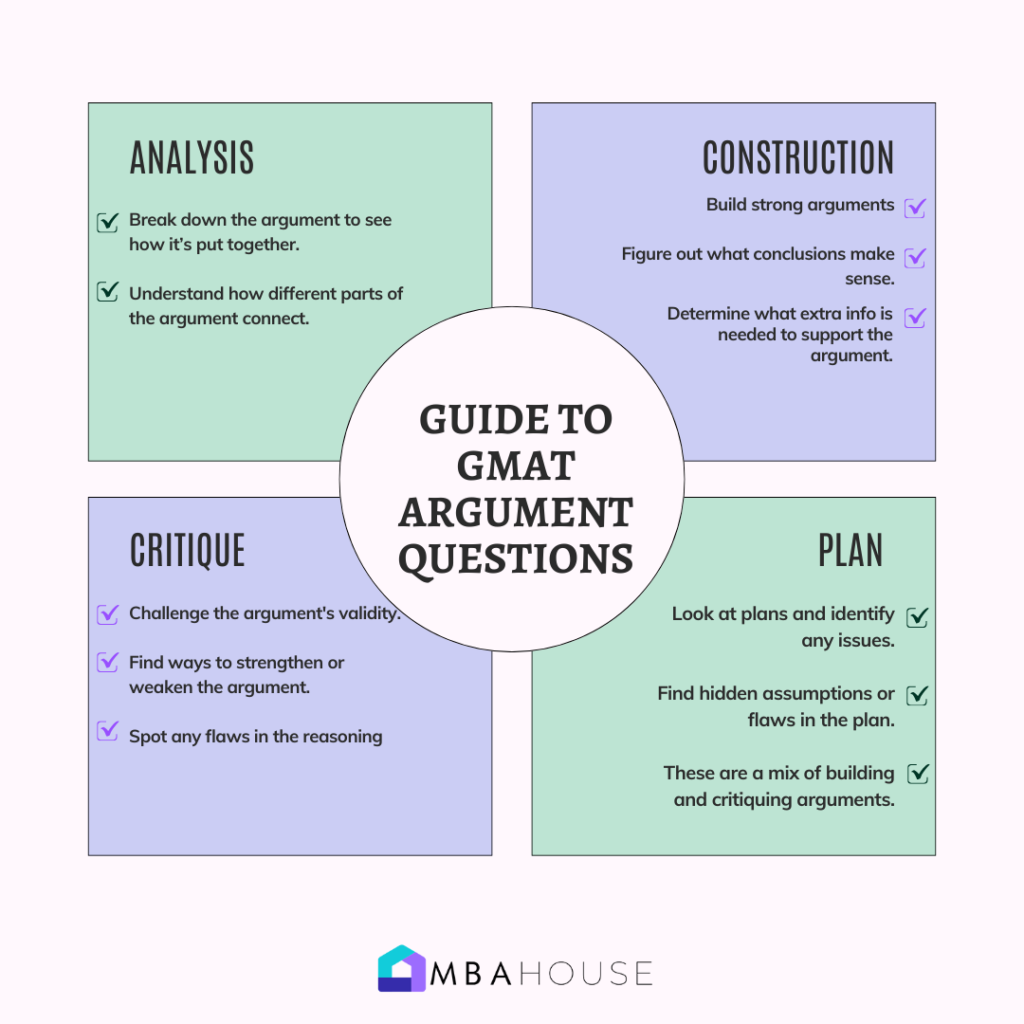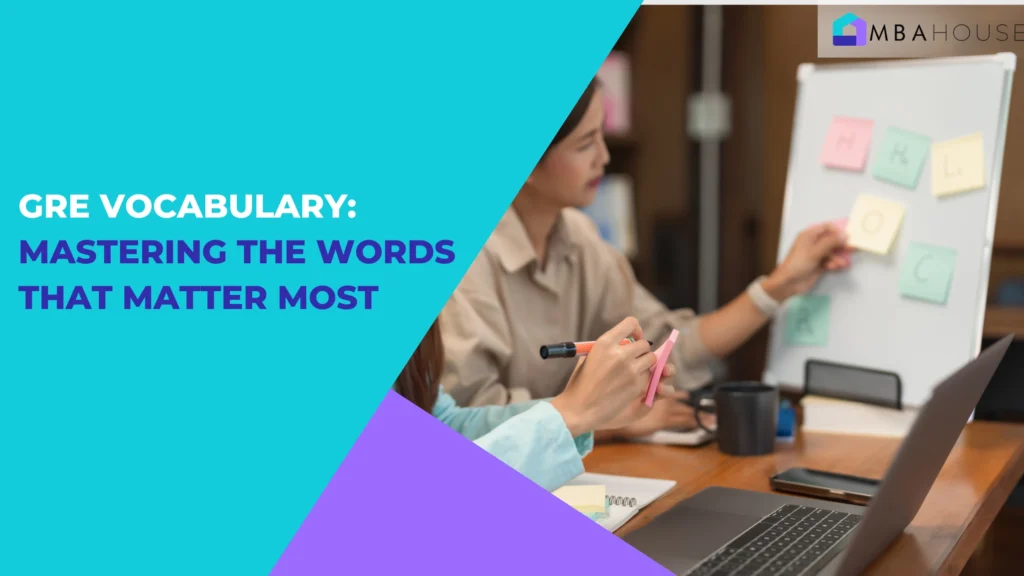The GMAT Verbal Reasoning section is all about understanding and analyzing written material. It’s one of the key parts of the GMAT, and with the new Focus Edition, it’s become even more important. This section tests your ability to read, think critically, and draw conclusions from passages and arguments.
In the GMAT verbal section, you’ll face 23 questions that need to be answered in 45 minutes. These questions are divided into two main types: Reading Comprehension, where you’ll read passages and answer questions about them, and Critical Reasoning, where you’ll analyze short arguments.
We know it can seem challenging, but with the right approach, you can do well. This blog is here to help you understand what to expect in the Verbal Reasoning section and how to tackle it effectively.
But before we do that, have a quick glimpse at each section for GMAT as per the new Focus Edition.
Breaking Down the GMAT Focus Edition Sections
| Section | Number of Questions | Time Allotted | What It Tests | Key Question Types |
| Quantitative Reasoning | 21 | 45 minutes | Math skills such as problem-solving and data analysis | Problem-Solving, Rates, Probability, Combinatorics, Ratios, etc. |
| Verbal Reasoning | 23 | 45 minutes | Reading comprehension, critical reasoning, and logical analysis | Reading Comprehension, Critical Reasoning |
| Data Insights | 20 | 45 minutes | Combination of quantitative, verbal reasoning, and real-world data interpretation skills | Data Sufficiency, Table Analysis, Graphics Interpretation, etc. |

A Deep Dive into the GMAT Verbal Section
If you’re gearing up for the GMAT, understanding the GMAT Verbal section is crucial to your preparation. This part of the test isn’t just about knowing the rules of grammar or being able to read quickly—it’s about reasoning, comprehension, and clear communication. But don’t worry, we’re going to break down everything you need to know, so by the end of this, you’ll feel much more confident tackling the GMAT Verbal questions.
What is Verbal Reasoning?
In the context of the GMAT, verbal reasoning involves your ability to understand and analyze written material, evaluate arguments, and correct written sentences to make them clear and effective. Essentially, it tests how well you can process language and use it to communicate ideas logically and effectively.
The GMAT Verbal section measures these skills over 65 minutes, during which you’ll need to answer 36 questions.
The challenge? You’ll have to do it all under the pressure of a ticking clock and the adaptive nature of the exam—meaning the difficulty of the questions adjusts based on your previous answers. But don’t stress! With the right preparation, you can ace it.
Types of Questions in the GMAT Verbal Section
Now, let’s get into the nitty-gritty of what you’ll face in the GMAT Verbal section.
GMAT Verbal Section: Skills Assessed
- Comprehending statements
- Grasping logical concepts within reading passages
- Drawing conclusions from facts and statements
- Interpreting the progression of quantitative ideas as presented in verbal content

There are three main types of questions: Reading Comprehension, Critical Reasoning, and Sentence Correction. Each type assesses different aspects of your verbal reasoning abilities.
Reading Comprehension
Reading comprehension questions evaluate how well you can understand and interpret written passages. You’ll be presented with a passage on a topic such as social sciences, business, or history, and you’ll need to answer a series of questions about it. The questions typically focus on identifying the main idea, distinguishing between explicit statements and implied ideas, and analyzing the structure and tone of the passage. To excel here, practice is key. The more you expose yourself to a variety of reading materials, the better you’ll become at quickly grasping and analyzing content.
Critical Reasoning
Critical reasoning questions are all about evaluating arguments. You’ll read a short passage that presents an argument, and your task is to answer questions that might ask you to strengthen or weaken the argument, identify assumptions, or draw inferences. This is where your logical thinking skills come into play. The trick here is to really break down the argument into its components—understand the premise, the conclusion, and any underlying assumptions.
Simplified Guide to Argument Questions
- Analysis
- Break down the argument to see how it’s put together.
- Understand how different parts of the argument connect.
- Construction
- Build strong arguments.
- Figure out what conclusions make sense.
- Determine what extra info is needed to support the argument.
- Critique
- Challenge the argument’s validity.
- Find ways to strengthen or weaken the argument.
- Spot any flaws in the reasoning.
- Plan
- Look at plans and identify any issues.
- Find hidden assumptions or flaws in the plan.
- These are a mix of building and critiquing arguments.

Sentence Correction
This might sound simple at first—correcting a sentence so it’s grammatically sound. But don’t be fooled. GMAT Verbal topics in sentence correction often involve complex sentence structures that test your knowledge of standard written English. You’ll need to identify and correct errors related to grammar, usage, and style, ensuring the sentence is both clear and concise. This is where knowing your grammar rules inside and out will pay off.
Proven GMAT Verbal Tips to Boost Your Score
Success in the GMAT Verbal section isn’t just about knowing the content; it’s also about strategy. Here are some tips to help you conquer this part of the test:
1. Time Management
With only 65 minutes to complete 36 questions, you have to be quick but accurate. Practice pacing yourself during your study sessions. Allocate a little less than two minutes per question, but remember to keep an eye on the clock and avoid getting stuck on any one question for too long.
2. Understand the Adaptive Nature of the Test
The GMAT Verbal section is adaptive, which means the difficulty of the questions will increase or decrease based on your performance. If you’re doing well, you’ll get tougher questions, which can boost your score. However, it’s crucial to stay calm and focused, especially if you encounter a challenging question. Answer it as best as you can and move on.
3. Focus on Your Weaknesses
As you prepare, take note of which types of verbal questions you struggle with the most. Is it sentence correction? Do critical reasoning questions trip you up? By identifying your weak points, you can tailor your study plan to focus on improving in those areas. There’s no shame in needing extra practice—everyone has their strengths and weaknesses.
4. Practice, Practice, Practice
This cannot be emphasized enough. The more you practice, the more familiar you’ll become with the GMAT Verbal topics and question formats. Use official GMAT practice tests and questions to get a feel for what the real test will be like. And remember, it’s not just about quantity—focus on the quality of your practice, analyzing your mistakes, and learning from them.
5. Keep Calm and Stay Positive
Finally, it’s important to keep a positive mindset. Test day can be stressful, but try to stay calm and focused. Remember, you’ve prepared for this, and you know how to tackle the GMAT Verbal questions. Take deep breaths, stay confident, and trust in your abilities.
The Importance of Consistent Practice
Consistent practice is your best friend when preparing for the GMAT Verbal section. It’s not just about cramming in as much information as possible—it’s about reinforcing the skills that the GMAT is testing. Regular practice helps you internalize grammar rules, sharpen your reasoning skills, and develop a quicker reading pace.
One effective method is to simulate test conditions during your practice sessions. Set a timer, avoid distractions, and take the practice questions seriously. This will help you get used to the pressure of the exam and improve your time management skills.
Resources to Help You Prepare
There are plenty of resources available to help you prepare for the GMAT Verbal Reasoning. Here are a few that you might find particularly helpful:
- Official GMAT Prep Materials
The official GMAT website offers a range of resources, including practice tests, sample questions, and study guides. These materials are designed to give you a clear idea of what to expect on test day and are an excellent starting point for your preparation. - GMAT Prep Books
There are several high-quality GMAT prep books available that provide in-depth coverage of the GMAT Verbal topics. These books often include practice questions, detailed explanations, and strategies for tackling different types of questions. - Online/Offline Courses
If you’re looking for a structured way to prepare, check out MBA House. They offer unlimited private tutoring, 21 GMAT classes (50 hours of instruction), both in-person and online, and access to study materials and recorded classes. With support teams in New York and Miami, they have the best course for GMAT Verbal prep and more. - Study Groups
Studying with others can be a great way to stay motivated and gain new insights. Consider joining a GMAT study group, either in person or online. Collaborating with others can help you understand difficult concepts, share study tips, and keep you on track.
Final Thoughts
The section can be challenging, but with focused preparation, consistent practice, and effective strategies, you’re on the path to success. Stay calm, trust your efforts, and approach test day with confidence. Best of luck!
FAQs on GMAT Verbal Section
Is verbal difficult in GMAT?
The difficulty of the GMAT verbal section can vary. The first verbal section consists of 12 questions with a mix of difficulty levels. Based on your performance in this section, the difficulty of the second verbal section will adjust accordingly. It might be easier, about the same, or harder depending on how well you did initially. So, while the verbal section can be challenging, your performance will help determine its level of difficulty.
How to get 40 in verbal GMAT?
To achieve a V40 on the GMAT Verbal section, focus on mastering each of the three components: Sentence Correction (SC), Critical Reasoning (CR), and Reading Comprehension (RC). Understand that success in Verbal isn’t just about knowing grammar rules but involves developing strong logical reasoning and reading skills. Start by assessing your current abilities with a reliable mock test to pinpoint your strengths and weaknesses. Then, systematically study and practice each sub-section, focusing on applying concepts rather than just memorizing rules. Regular practice with high-quality materials and adapting your strategy based on feedback can significantly boost your score. For a structured and personalized study plan write us on: [email protected]
How long is the GMAT verbal section?
The GMAT Verbal section lasts for 65 minutes and consists of 36 questions. During this time, you’ll encounter three distinct types of questions: Sentence Correction, Critical Reasoning, and Reading Comprehension. To effectively manage your time, it’s important to develop specific strategies for each question type. Balancing your approach for each category will help you maximize your performance in the allotted time.





Social Media